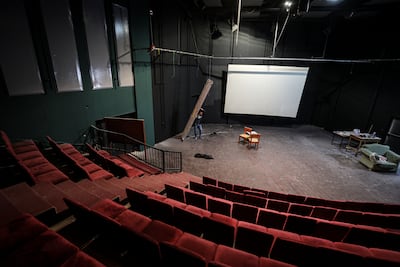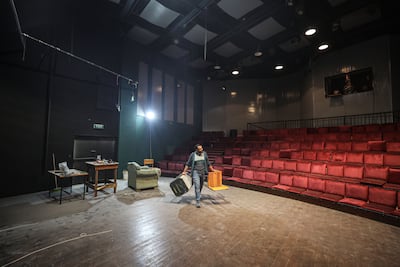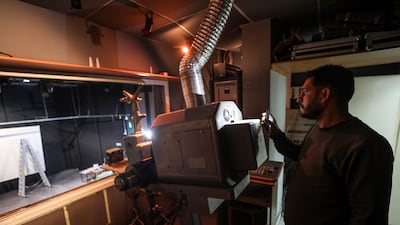Determined to bring the silver screen to Gaza, filmmakers are transforming a neglected theatre into the Palestinian enclave’s only working cinema.
“No cinema exists in Gaza," said filmmaker Abed Al Rahman Hussein. "Not in terms of screenings, nor in terms of the industry either."
After years showing films in the rubble of bomb sites and on Gaza’s streets, he and fellow cinephiles believe they have eventually found a permanent home.
Dusty footprints mark the wooden floor of the disused theatre, which opened in the late 1990s but was abandoned just a few years later.
A torn screen hangs from the ceiling, while cobwebs are gathering on the old Bauer projector.
“Ten cinemas existed [in Gaza] from the 1930s to the 1980s, until there was a revolt on the cinemas,” said Hussein.
“A revolt to change culture, in which anything related to cinema was haram [forbidden in Islam], prohibited, shunned.”
Ten cinemas existed [in Gaza] from the 1930s to the 1980s, until there was a revolt on the cinemas
Abed Al Rahman Hussein,
filmmaker
Gaza saw a brief revival of cultural spaces in the 1990s, when the now-empty theatre was opened, before being abandoned in 2006 with the outbreak of fighting between Palestinian factions.
Gaza has since been ruled by Islamist group Hamas, while Israel has imposed a blockade on the territory which prevents the majority of residents from leaving.
Muntaser Al Sabaa, the co-ordinator of the new cinema project, said renovating the theatre represented a “huge challenge” but the team was well-prepared.
“We know everything about the history of cinema here in Palestine,” he said, recounting how each cinema specialised in a certain genre and how films were brought to Gaza's refugee camps.
As cinemas have gathered dust in recent years, Mr Al Sabaa and other film enthusiasts have been working to bring movies to Gazans.
If there are no cinema halls, we will screen in the street until we have cinema halls
Muntaser Al Sabaa,
cinema restoration co-ordinator
“If there are no cinema halls, we will screen in the street until we have cinema halls,” he said, recalling their failed attempt to reopen one venue more than two years ago.
Filmmakers began holding a Red Carpet Human Rights Film Festival in 2015, initially with screenings amid the rubble of buildings destroyed during the war with Israel the previous year.
Led by Hussein, the annual festival gained approval from the authorities in 2019 to move from the streets to the disused Amer Cinema in Gaza city.
“There were some small problems, related to the owners of the place, and some threats from some extremists,” Hussein said.
Officials ultimately banned the festival from taking place inside the cinema, prompting the organisers to host all screenings outside once more.
Months later, the coronavirus pandemic arrived and the festival was stopped, but the filmmakers stayed busy.
Officials gave them the go-ahead in October to restore the theatre, which is part of the Holst cultural centre near Gaza’s historic quarter.
The theatre smells of fresh paint, and the seats are being re-upholstered.
“If a lot of people start believing again in this idea, if a lot of people benefit from this industry, that means that one day we will reach our goal,” Al Sabaa said.
The filmmakers said they were awarded funding from the A.M. Qattan Foundation, a cultural organisation, and the Swiss Agency for Development and Co-operation.
Within weeks they hope to start screening family films, while also hosting performances such as puppet shows.
Thousands of people have attended festivals and one-off screenings in recent years, many of whom have never been inside a cinema.
Farrah Jaber, who works in a mall, said she dreamt of going to the cinema and sharing popcorn with her friends.
When I watch a scene in a movie where characters are watching a movie, in the cinema, I feel jealous and want to live this experience too
Farrah Jaber,
23-year-old Gaza resident
“When I watch a scene in a movie where characters are watching a movie, in the cinema, I feel jealous and want to live this experience too,” the 23-year-old told The National.
With most of Gaza’s two million residents unable to leave the territory, Al Sabaa sees cinema as a way of showing Palestinians the world beyond its borders.
“That’s what we are seeking,” he said, of his desire to offer residents a cultural experience which has been inaccessible for years. “Opening this kind of window, and making them sit and see what we mean when we say a normal life.”
HOW%20TO%20ACTIVATE%20THE%20GEMINI%20SHORTCUT%20ON%20CHROME%20CANARY
%3Cp%3E1.%20Go%20to%20%3Cstrong%3Echrome%3A%2F%2Fflags%3C%2Fstrong%3E%3C%2Fp%3E%0A%3Cp%3E2.%20Find%20and%20enable%20%3Cstrong%3EExpansion%20pack%20for%20the%20Site%20Search%20starter%20pack%3C%2Fstrong%3E%3C%2Fp%3E%0A%3Cp%3E3.%20Restart%20Chrome%20Canary%3C%2Fp%3E%0A%3Cp%3E4.%20Go%20to%20%3Cstrong%3Echrome%3A%2F%2Fsettings%2FsearchEngines%3C%2Fstrong%3E%20in%20the%20address%20bar%20and%20find%20the%20%3Cstrong%3EChat%20with%20Gemini%3C%2Fstrong%3E%20shortcut%20under%20%3Cstrong%3ESite%20Search%3C%2Fstrong%3E%3C%2Fp%3E%0A%3Cp%3E5.%20Open%20a%20new%20tab%20and%20type%20%40%20to%20see%20the%20Chat%20with%20Gemini%20shortcut%20along%20with%20other%20Omnibox%20shortcuts%20to%20search%20tabs%2C%20history%20and%20bookmarks%3C%2Fp%3E%0A
Desert Warrior
Starring: Anthony Mackie, Aiysha Hart, Ben Kingsley
Director: Rupert Wyatt
Rating: 3/5
The biog
Name: Dhabia Khalifa AlQubaisi
Age: 23
How she spends spare time: Playing with cats at the clinic and feeding them
Inspiration: My father. He’s a hard working man who has been through a lot to provide us with everything we need
Favourite book: Attitude, emotions and the psychology of cats by Dr Nicholes Dodman
Favourit film: 101 Dalmatians - it remind me of my childhood and began my love of dogs
Word of advice: By being patient, good things will come and by staying positive you’ll have the will to continue to love what you're doing
Benefits of first-time home buyers' scheme
- Priority access to new homes from participating developers
- Discounts on sales price of off-plan units
- Flexible payment plans from developers
- Mortgages with better interest rates, faster approval times and reduced fees
- DLD registration fee can be paid through banks or credit cards at zero interest rates
The White Lotus: Season three
Creator: Mike White
Starring: Walton Goggins, Jason Isaacs, Natasha Rothwell
Rating: 4.5/5
GOODBYE%20JULIA
%3Cp%3E%3Cstrong%3EDirector%3A%20%3C%2Fstrong%3EMohamed%20Kordofani%3C%2Fp%3E%0A%3Cp%3E%3Cstrong%3EStarring%3A%20%3C%2Fstrong%3ESiran%20Riak%2C%20Eiman%20Yousif%2C%20Nazar%20Goma%3C%2Fp%3E%0A%3Cp%3E%3Cstrong%3ERating%3A%3C%2Fstrong%3E%205%2F5%3C%2Fp%3E%0A
Explainer: Tanween Design Programme
Non-profit arts studio Tashkeel launched this annual initiative with the intention of supporting budding designers in the UAE. This year, three talents were chosen from hundreds of applicants to be a part of the sixth creative development programme. These are architect Abdulla Al Mulla, interior designer Lana El Samman and graphic designer Yara Habib.
The trio have been guided by experts from the industry over the course of nine months, as they developed their own products that merge their unique styles with traditional elements of Emirati design. This includes laboratory sessions, experimental and collaborative practice, investigation of new business models and evaluation.
It is led by British contemporary design project specialist Helen Voce and mentor Kevin Badni, and offers participants access to experts from across the world, including the likes of UK designer Gareth Neal and multidisciplinary designer and entrepreneur, Sheikh Salem Al Qassimi.
The final pieces are being revealed in a worldwide limited-edition release on the first day of Downtown Designs at Dubai Design Week 2019. Tashkeel will be at stand E31 at the exhibition.
Lisa Ball-Lechgar, deputy director of Tashkeel, said: “The diversity and calibre of the applicants this year … is reflective of the dynamic change that the UAE art and design industry is witnessing, with young creators resolute in making their bold design ideas a reality.”
The biog
Hobbies: Salsa dancing “It's in my blood” and listening to music in different languages
Favourite place to travel to: “Thailand, as it's gorgeous, food is delicious, their massages are to die for!”
Favourite food: “I'm a vegetarian, so I can't get enough of salad.”
Favourite film: “I love watching documentaries, and am fascinated by nature, animals, human anatomy. I love watching to learn!”
Best spot in the UAE: “I fell in love with Fujairah and anywhere outside the big cities, where I can get some peace and get a break from the busy lifestyle”
White hydrogen: Naturally occurring hydrogen
Chromite: Hard, metallic mineral containing iron oxide and chromium oxide
Ultramafic rocks: Dark-coloured rocks rich in magnesium or iron with very low silica content
Ophiolite: A section of the earth’s crust, which is oceanic in nature that has since been uplifted and exposed on land
Olivine: A commonly occurring magnesium iron silicate mineral that derives its name for its olive-green yellow-green colour
Dark Souls: Remastered
Developer: From Software (remaster by QLOC)
Publisher: Namco Bandai
Price: Dh199
Suggested picnic spots
Abu Dhabi
Umm Al Emarat Park
Yas Gateway Park
Delma Park
Al Bateen beach
Saadiyaat beach
The Corniche
Zayed Sports City
Dubai
Kite Beach
Zabeel Park
Al Nahda Pond Park
Mushrif Park
Safa Park
Al Mamzar Beach Park
Al Qudrah Lakes
UAE currency: the story behind the money in your pockets
INDIA SQUAD
Virat Kohli (capt), Rohit Sharma, Shikhar Dhawan, KL Rahul, Vijay Shankar, MS Dhoni (wk), Kedar Jadhav, Dinesh Karthik, Yuzvendra Chahal, Kuldeep Yadav, Bhuvneshwar Kumar, Jasprit Bumrah, Hardik Pandya, Ravindra Jadeja, Mohammed Shami
More coverage from the Future Forum
Dhadak 2
Director: Shazia Iqbal
Starring: Siddhant Chaturvedi, Triptii Dimri
Rating: 1/5
Mohammed bin Zayed Majlis



